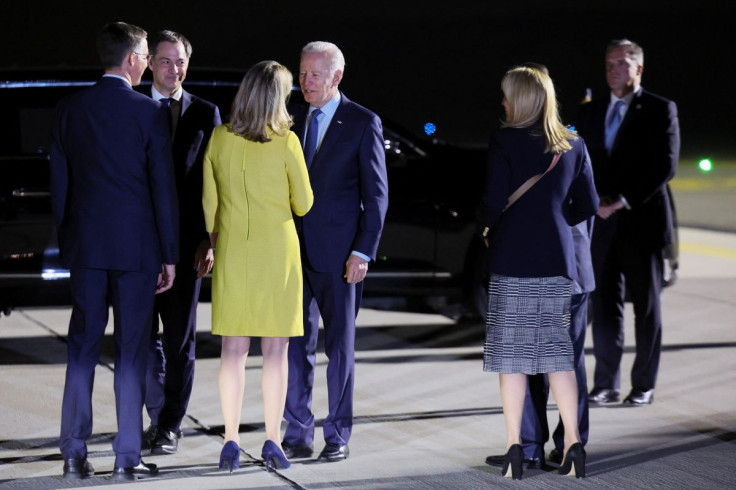West United In Support For Ukraine But EU Split On Russian Energy Ban

NATO offered Kyiv new military assistance and assigned more troops to its eastern flank on Thursday as London and Washington imposed fresh sanctions on Moscow in a show of Western unity against Russia's war in Ukraine.
NATO, G7 and EU leaders who were meeting in Brussels, however, fell short of satisfying pleas by Ukrainian President Volodymyr Zelenskiy for a significant boost to military aid and tighter sanctions against Russian President Vladimir Putin.
The European Union squabbled over cutting Russian energy links with Germany, the key opponent of an embargo, though NATO leaders agreed to help Ukraine protect itself against any chemical, biological or nuclear attacks.
A U.S. official said Washington and allies were also working to provide Kyiv with anti-ship missiles.
Britain slapped sanctions on more Russian lenders and the United States targeted dozens of Russian defense companies and members of the ruling class. Addressing the 27 EU member countries, Latvia demanded a ban on Russian energy imports.
"Energy sanctions are a way to stop money flowing into Putin's war coffers", said Latvian Prime Minister Arturs Karins
"The most logical place to move forward is in oil and coal. We have to stop Putin. Because if we do not stop Putin, Putin will not stop."
His Estonian colleague opted for targetting oil and gas to prevent revenue from energy sales from financing the war. But the bloc did not get unanimous support for further sanctions.
The prime minister of Luxembourg said the bloc needed to keep some options open in case the crisis worsens, and his Dutch peer said no new sanctions would be agreed on Thursday.
The EU has only been reducing its reliance on Russian energy very slowly and the industry has largely been exempt from sanctions - the biggest loophole in measures that have otherwise frozen Russia out of world commerce.
EU leaders are expected, however, to agree at their summit to jointly buy gas and hope for a deal with U.S. President Joe Biden to secure additional U.S. liquefied natural gas supplies.
The bloc has struggled to implement the sanctions already agreed, with Russian oligarchs' wealth largely untouched weeks since the invasion of Ukraine.
Ukraine is a former Soviet republic that wants to join the EU and NATO, plans that are anathema to Moscow, which attacked Ukraine by land, air and sea on Feb. 24. Putin has said his "special operation" is designed to destroy Ukraine's military capabilities and capture what Moscow regards as dangerous nationalists.
The Russian invasion has killed thousands and driven a quarter of Ukraine's 44 million people from their homes.
WARNING TO CHINA
NATO, which has already beefed up its eastern flank to 40,000 troops spread from the Baltic to the Black Sea, agreed on Thursday to set up new combat units in Bulgaria, Romania, Hungary and Slovakia.
The alliance also warned that China should "abstain from supporting Russia's war effort in any way, and to refrain from any action that helps Russia circumvent sanctions", a comment echoed by Finland's Prime Minister Sanna Marin.
"If China helps Russia, then the sanctions won't work as we want them to work," she said on arriving to the EU summit being held after a NATO and a G7 one.
The U.S. official said the G7 and the EU - which will hold a summit with China on April 1 - would make clear any transactions involving Russian gold reserves were covered by sanctions in a move aimed at stopping Russia from evading the penalties.
The month-long invasion has hit residential areas, schools and hospitals in Ukrainian cities including Kharkiv and the besieged port of Mariupol on the Sea of Azov. Russia denies targeting civilians.
"Putin has already crossed the red line into barbarism," British Prime Minister Boris Johnson said as London unveiled restrictions on Gazprombank and Alfa Bank, as well as on the stepdaughter of Russian Foreign Minister Sergey Lavrov.
"The harder our sanctions ... the more we can do to help Ukraine ... the faster this thing can be over," Johnson said.
NATO has, however, turned down repeated pleas by Kyiv to defend Ukraine's skies and said it would not send troops to Ukraine for fear of being dragged into a full-on military confrontation with nuclear-armed Russia.
"We remain united and resolute in our determination to oppose Russia's aggression, aid the government and the people of Ukraine, and defend the security of all allies," NATO leaders said in a joint statement.
© Copyright Thomson Reuters 2024. All rights reserved.





















